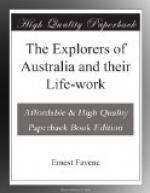At the southern entrance of Albany Pass, one of the most picturesque spots of the east coast of Australia, the schooner Ariel lay at anchor, awaiting, day after day, some signal to indicate the arrival of the expected Kennedy. One day the look-out man announced that there was an aboriginal on the mainland making urgent signals to the schooner. There was nothing unusual in this, for during the delay and tedious waiting, the blacks had constantly been seen making gestures on the shore. An examination through the glass, however, showed the people on the Ariel that this blackfellow was making such vehement and persistent signals that it was thought worth while to send the boat in to investigate affairs.
No wonder the poor fellow’s signals were urgent and vehement; he was Jacky-Jacky, who, thirteen days after Kennedy’s death, by devious twistings and windings, occasionally climbing a tree in the hope to catch a glimpse of the schooner, and existing on roots and vermin, had at last reached the goal. But when he stood prominently on the shore to signal to the schooner, his relentless pursuers sighted him, and his frantic signs were for rescue from imminent peril. The boat’s crew fortunately recognised the emergency, and a smart race ensued between them and the natives. The rescuers won, and Jacky-Jacky was saved to tell his melancholy story.
There was no time lost on board the Ariel. There were three men who might be still alive at Shelburne Bay, and eight more starving at Weymouth Bay. Kennedy was dead; their duty, and urgent duty it was, lay with the living. At once the schooner commenced to beat down the coast, and at Shelburne Bay they landed but failed to find the camp. But they seized a native canoe which bore sufficient evidence that the men had been murdered. Clearly time must not be wasted in inflicting punishment; according to Jacky’s account, the men at Weymouth Bay were absolutely starving, if they had not already succumbed to famine.
After their leader had left Weymouth, Carron had shifted the camp on to the nearest hill, as it was more open and less exposed to the treacherous attacks of the natives. A flagstaff was erected on the crest, in view of the Bay. Then the party had only to sit down and await the coming of the grim shadow following them through the jungle to strike them with the death chill. They had two skeletons of horses and two gaunt dogs, and a tiny remnant of flour. The men gave themselves up to moody despondency. “Wearied out by long endurance of trials that would have shaken the courage and tried the fortitude of the strongest,” says Carron in his diary, “a sort of sluggish indifference prevailed that prevented the development of those active energies which were necessary to support us in our present critical position.”




